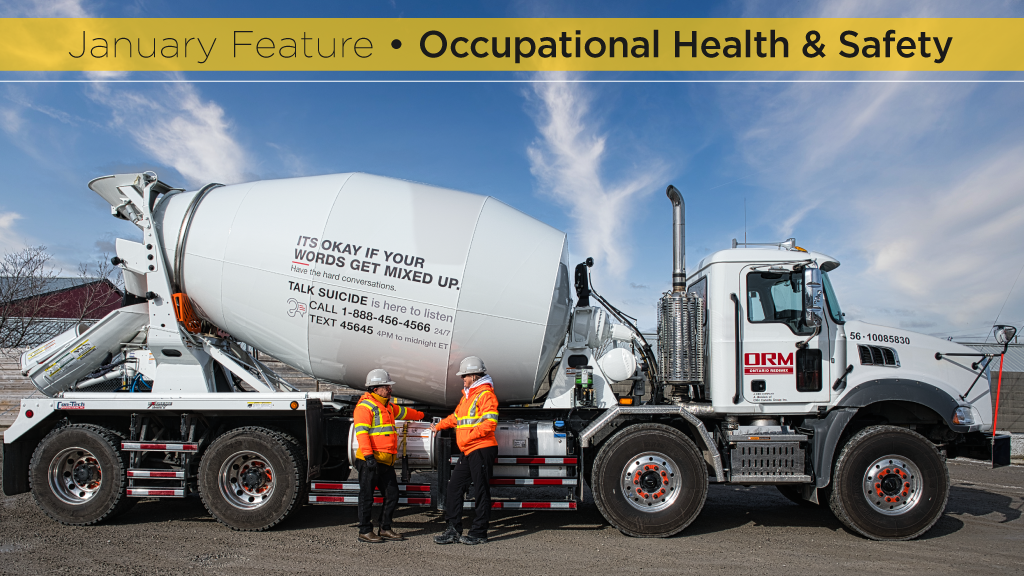The rate of suicide for construction workers is 53.3 per 100,000, according to 2022 data from the Centers for Disease Control and Prevention in the United States.
The only sector with a higher rate was oil and gas extraction.
Mental health in general, and suicide in particular, are sensitive subjects in the construction industry.
Any anti-suicide information/education campaign directed at construction workers needs to combine medium and message in a way that work together and enhance each other.
CRH Canada Group Inc. put a visible suicide prevention message on the side of company vehicles to encourage workers to seek help at the Talk Suicide hotline https://988.ca.
“We currently have 11 ready-mix concrete trucks in Ontario and five ready-mix concrete trucks in Quebec carrying the message,” says Shannon Truax-Wardell, vice-president of safety and health at CRH. “We also have 30 pick-up trucks in Ontario with the message on the tailgate. And every employee has a hard-hat sticker with the crisis hotline phone numbers.”
Truax-Wardell says CRH Canada has made use over the years of the size and mobility of its concrete trucks to convey different messages.
“It was a logical choice for this campaign, as the large surface area allows us to maximize the message,” she says. “Our trucks travel daily, so they become mobile billboards. It is a great way to ensure visibility.”
Reaction to the company’s initiative has been positive.
“We have had individuals come forward and thank us,” says Truax-Wardell. “They told us it helped them and their family members. In fact, we have had police officers commend us as well.”
The campaign is expected to continue indefinitely.
“We plan to put the suicide-prevention message on other vehicles in our organization, such as construction trucks,” she says.
John Ogrodniczuk, director of the University of British Columbia’s psychotherapy program and founder of HeadsUpGuys (“Strategies for improving mental health and preventing suicide”), says effective communication in construction should be specific, concise, highly visible with a clear call to action.
“A great example is CRH posting its message on cement trucks,” says Ogrodniczuk. “You want to get in front of people’s eyeballs in the most obvious ways possible, so they actually see your message. Think of giant billboards, buses or signage at urinals in men’s washrooms.”
Modern Niagara Group Inc. offers a mental health first aid course (MHFA). Verna Liezl Perdon, the mental health and psychological safety specialist at Modern Niagara, says, “MHFA is support for a person experiencing a decline in their mental health or a substance use crisis.”
The course has been delivered to over 280 people. Modern Niagara employees, clients, unions and other external stakeholders have taken the course.
Perdon says the company uses such communication methods as email, in-person talks, virtual education sessions, posters, social media and video.
“Email communication has the widest, quickest and most efficient reach across our regions in Canada,” says Perdon. “In-person visits to our field sites are also valuable. Mental health topics can be sensitive, so to deliver in-person health, safety and wellness talks makes it more engaging, approachable and authentic.”
In 2021, the BC Construction Safety Alliance funded the production of The Lone Hunter, a short video that dramatized the downward slide of a fictional construction worker named Dave into a serious mental health problem.
“It’s hard to get people to talk about suicide, but there is plenty of interest in the subject and it is growing,” says Diana Vissers, a workplace mental health expert and co-producer of The Lone Hunter.
“The video shows a construction worker who is having very dark thoughts, but his colleagues notice and help him get the mental health care he needs,” says Vissers. “The Lone Hunter teaches the sufferer’s colleagues what to do and how to do it.”
Vissers says it’s important to talk about suicide before it becomes a crisis.
“Talk about the risk of suicide in the same way you talk about other workplace hazards, such as strains and injuries and falls from heights,” she says. “People can learn how to talk about suicide and its prevention. It’s a learnable skill.”
Josias Tschanz, the director and co-producer of The Lone Hunter, says the video is often played at company orientation events.
“The main actor in the video who played Dave the construction worker has also made a couple of radio ads that are played during Vancouver Canucks hockey games,” says Tschanz.
It’s important to create a conversation piece that gets people talking about suicide, he says.
“People need to feel safe and comfortable before they discuss such a sensitive topic,” says Tschanz.



Recent Comments